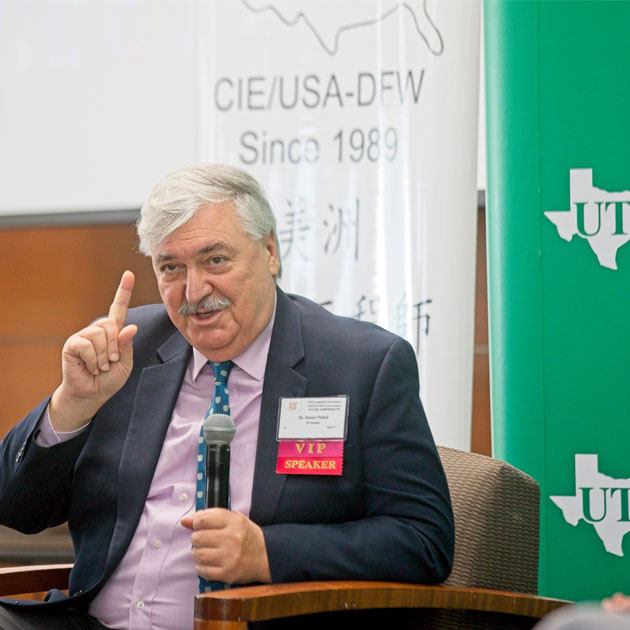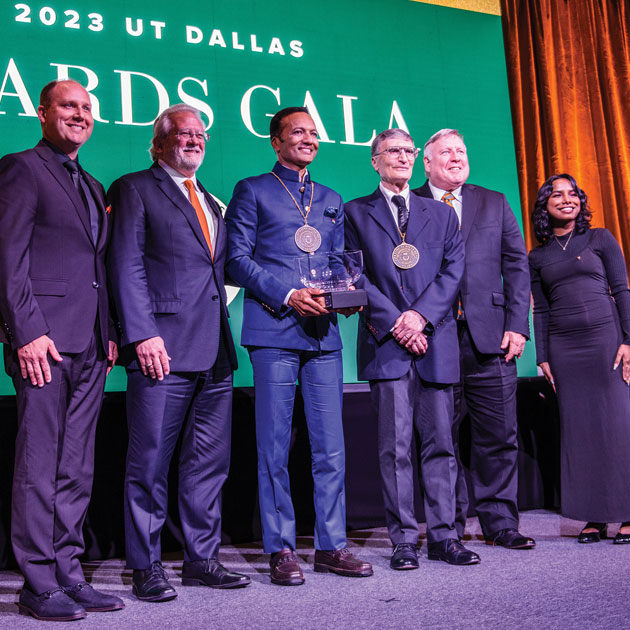- Research Productivity on the Rise, UT Dallas Top 100 Rankings Show
- Emerging Technologies Summit Showcases AI, Blockchain and Fintech
- New Program at the Jindal School Advances Free-Enterprise Education
- Jindal School Center Launches New Research Partnership in France
- Jindal Young Scholars Program Welcomes Its First Cohort for Fall
- Faculty News and Achievements
- Student News
- Alumni News
Research Productivity on the Rise, UT Dallas Top 100 Rankings Show
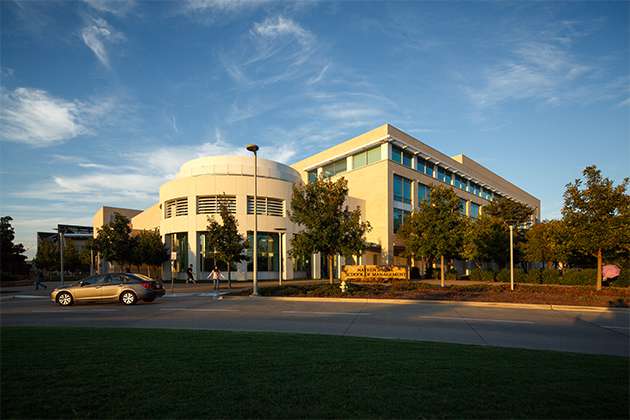
The Naveen Jindal School of Management has maintained a top 10 ranking in the latest UT Dallas Top 100 Business School Research RankingsTM. It landed at No. 6 in the North American rankings and No. 7 worldwide.
The Wharton School at the University of Pennsylvania has topped the North American and worldwide standings every year since the rankings were first published in 2005. Despite Wharton’s solid hold on the No. 1 spot, data released Feb. 22 show other schools in the rankings are increasingly productive. The gap between them and Wharton has narrowed.
Since 2005, the Jindal School annually has updated its compilation of faculty research published in 24 leading peer-reviewed journals. Each year, the rankings are determined based on an aggregate of results from the previous five years.
The UT Dallas Top 100 “is a valuable tool because it measures something that no other ranking has measured,” Dr. Hasan Pirkul, dean of the Jindal School and Caruth Chair, said. “It provides information about faculty research productivity across all the disciplines found in a business school, not just specific ones. That’s an important consideration for potential students and faculty members who value research.”
The latest rankings reveal that the choice is becoming more difficult to make: The gap in research output between the top schools and those further down the list has closed considerably. In 2005, the difference between the scores of the No. 1 and No. 100 schools in the worldwide ranking was 2,022 percent. That difference has now tightened to 899 percent. The difference between No. 1 and No. 10 is now just 180 percent, compared to 226 percent 14 years ago.
For a complete listing of the most recent research productivity rankings, visit The UTD Top 100 Business School Research RankingsTM.
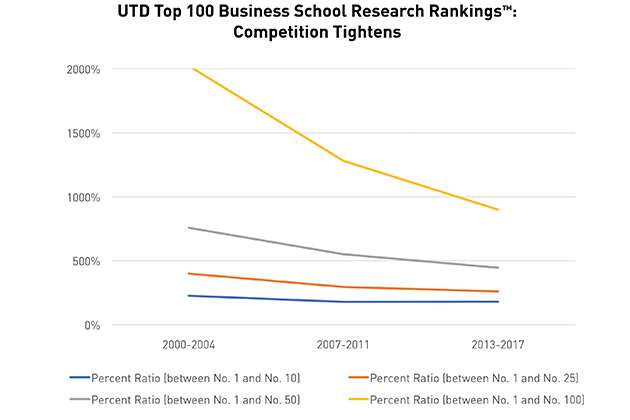
Top 10 Business Schools Worldwide
- University of Pennsylvania, The Wharton School
- Harvard University, Harvard Business School
- New York University, Leonard N. Stern School of Business
- INSEAD
- Massachusetts Institute of Technology, Sloan School of Management
- University of Southern California, Marshall School of Business
- The University of Texas at Dallas, Naveen Jindal School of Management
- University of Chicago, Booth School of Business
- University of Toronto, Joseph L. Rotman School of Management
- University of Michigan at Ann Arbor, Stephen M. Ross School of Business
Top 10 Business Schools in North America
- University of Pennsylvania, The Wharton School
- Harvard University, Harvard Business School
- New York University, Leonard N. Stern School of Business
- Massachusetts Institute of Technology, Sloan School of Management
- University of Southern California, Marshall School of Business
- The University of Texas at Dallas, Naveen Jindal School of Management
- University of Chicago, Booth School of Business
- University of Toronto, Joseph L. Rotman School of Management
- University of Michigan at Ann Arbor, Stephen M. Ross School of Business
- Columbia University, Graduate School of Business
Emerging Technologies Summit Showcases AI, Blockchain and Fintech
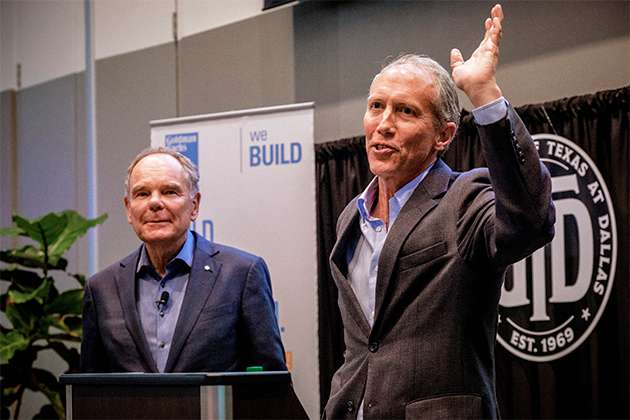
What does global banking have in common with “super bug” bacteria, children with autism and the Olympics?
They will all be hugely affected by new technology, according to speakers at UT Dallas’ inaugural Emerging Technologies (EmTech) Summit.
The summit, held April 18-19, took a deep dive into lightning-fast changes taking place in artificial intelligence (AI), financial technology (fintech), and distributed ledger technologies such as blockchain and hashgraph that let any two parties exchange value and assets without government or financial institution oversight.
“UT Dallas launched the EmTech Summit to give faculty, students and professionals a deeper understanding of how and why tech is changing so quickly,” said Steve Guengerich, executive director of the Institute for Innovation and Entrepreneurship, whose academic programs are based in the Naveen Jindal School of Management.
“A key component of the institute’s mission is ‘innovation’ leadership, helping UT Dallas stay at the forefront of all these important new topics. Working with faculty and business leaders, we view the summit as a platform for inspiring new research and convening pioneering people and companies to collaborate,” Guengerich said.
Don Tapscott, executive director of the Blockchain Research Institute and author of 15 books related to the impact of technology on business and society, kicked off the summit. His address provided an audience of more than 500 a primer on blockchain technology. He also detailed how this framework will transform the business landscape by offering a way to securely keep up with the huge amounts of data involved with rapidly evolving technological changes.
“We’re entering into a second era of the internet,” Tapscott said, explaining that he envisions a democratization of data in which virtually everyone will gain access to tools currently accessible only to those who can afford the steep costs.
More than 20 tech innovators from around the globe spoke about dozens of topics.
Improved medical care was on the agenda of several discussions. In a session on how AI and machine learning affect retail, Scott Mackey of Smarter Sorting said his techno-based environmental compliance company uses blockchain to make sure unused opioid pills are destroyed to prevent drug abuse.
Nano Vision co-founder Brian Magierski explained how cryptocurrency “cure coins” can foster investment and research for everything from Alzheimer’s disease to cancer to “super bug” bacteria that can be detected by microsensors.
At the same session, RoboKind co-founder Richard Margolin unveiled Milo, a two-foot-tall socially interactive robot being used in schools in Dallas-Fort Worth and around the country to improve education for children with autism.
Many sessions involved discussions of decentralized applications — dapps — and cryptocurrencies like bitcoin.
Blockchain evangelist and IBM futurist Mark Hopkins, co-founder of The Roger Wilco Agency, a branding and marketing company, said cryptocurrencies will help poorer countries develop faster by “banking the unbanked” and putting more power into the hands of individuals.
“Give [cryptocurrency] a few decades, and the potential is enormous,” said Arnold Spencer, general counsel of Coinsource, a bitcoin ATM company.
Dave Copps, founder of machine-learning software company Brainspace, was one of several speakers who talked about the rapid development of AI, which he described as “the science of teaching machines to think like a new species … not to think like humans.”
Copps envisioned a future in which trillions of sensors drive the global economy, robots take care of the elderly, and DNA editing creates a new breed of athletes who compete in a “genetically modified Olympics.”
Despite all the talk of breakneck advancements, a recurring theme was the idea that change that improves the quality of life remains the goal of all this innovation.
Leemon Baird — founder of hashgraph, a distributed-ledger-technology alternative to blockchain, and co-founder and chief technology officer of Swirlds, a related software platform — has said what matters most is what the speed enables you to accomplish.
“We want to make moves that are revolutionary,” Baird said. “Whether it’s seven transactions per second or thousands of transactions per second, we want to change society.”
New Program at the Jindal School Advances Free-Enterprise Education
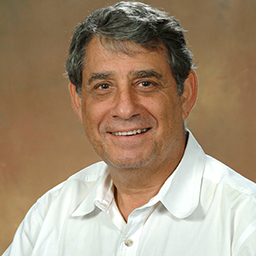
The Naveen Jindal School of Management has launched a program to help students gain a better understanding of the American free-enterprise system.
The Colloquium for the Advancement of Free-Enterprise Education (CAFÉ) teaches the foundations of economic freedom and the function of ownership rights — and how they affect business practice.
“I want to educate students who are not only trained in their specific academic areas but who are also educated in economic principles underlying the American free-enterprise system so that they can go on to become well-informed business leaders,” says Dr. Peter Lewin, program director and a professor of finance and managerial economics.
Operating within the Center for the Analysis of Property Rights and Innovation, CAFÉ will every fall invite undergraduate and graduate JSOM students to apply for a fellowship. The 2018 CAFÉ fellows cohort includes 11 undergraduate and seven master’s students.
CAFÉ is jointly funded by a grant of up to $840,000 from a donor — a UT Dallas graduate who wishes to remain anonymous — and the Charles Koch Foundation, a charitable organization that supports scholarship in such issues as criminal justice and policing reform, toleration and free speech, foreign policy, economic freedom, technology and innovation, and K-12 education.
Undergraduate CAFÉ fellows receive up to $5,000, and graduate fellows receive up to $10,000. Fellows complete two courses that examine in detail the comparative performance of economies with different institutional structures.
Fellows also are eligible to participate in elective activities related to the program’s mission.
Other opportunities for graduate fellows include research, assisting and supervising program undergraduates, and assisting faculty with research or viewpoint articles.
The target audience for CAFÉ research “consists of connected, aware, curious business people and academics, and the think-tank environment,” Lewin says. “The main focus of our program is educational, but we also have a robust research component.”
Jindal School Center Launches New Research Partnership in France
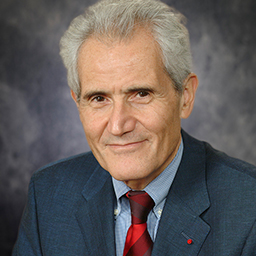
The International Center for Decision and Risk Analysis (ICDRiA) in the Naveen Jindal School of Management has joined forces in a research partnership with the new Risk and Insurance Institute at Le Mans University in France.
Dr. Alain Bensoussan, director of ICDRiA and a Jindal School professor of risk and decision analysis who holds a Lars Magnus Ericsson Chair, signed the formal agreement for the partnership last November in France.
“This agreement will contribute greatly to UT Dallas’ goal of successfully developing international relations,” Bensoussan said. “Joining forces with a dynamic school like Le Mans University will build strength and create positive results that will benefit both universities.”
Dr. Hasan Pirkul, Jindal School dean, who also signed the agreement, said “the partnership will enhance the Jindal School’s research profile in Europe and promises to establish welcome new ties in energy, finance, insurance, operations management and other disciplines.”
The French-born Bensoussan joined the UT Dallas faculty in 2004 after leading the European Space Agency from 1999 to 2002. He founded ICDRiA in 2004 to study how large-investment industrial projects can better manage risks, uncertainties and decision-making.
Le Mans, 130 miles southwest of Paris, is best known for its annual endurance sports car race. But it is also the home of several global insurance headquarters, which collaborate with Le Mans University on risk analysis initiatives. The new partnership between UT Dallas and Le Mans University’s Risk and Insurance Institute will “create a critical mass” in researching the insurance, health and energy industries, Bensoussan said.
The partners already have embarked on several projects, including a collaboration with Eren, a French renewable energy company that invests in wind farms.
Another project involves a company that wants to better use stochastic maintenance, which Bensoussan described as “preventative medicine” for maintaining any type of structure, from airplanes to bridges to industrial plants.
Bensoussan called the research partnership “a win-win situation.”
“We’ll be working together with good people, exchanging ideas and building momentum,” he said. “By cooperating, instead of isolating ourselves, we can both create something significant.”
Jindal Young Scholars Program Welcomes Its First Cohort for Fall
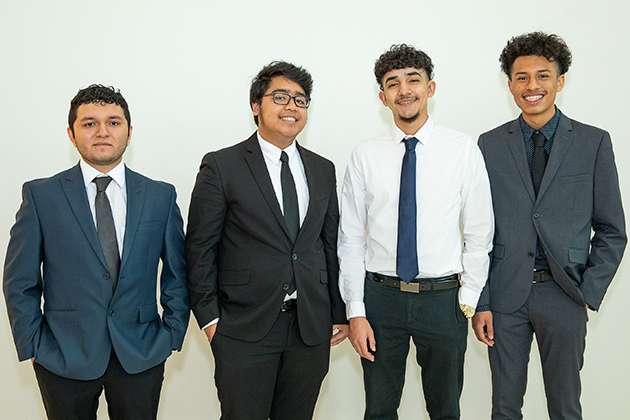
From left: Giovanny Lopez, Jason Manzala, Mike Campos and Oscar Urrutia make up the initial cohort of the Jindal Young Scholars Program.
Four seniors from the Dallas Independent School District recently became the initial cohort of The University of Texas at Dallas’ Jindal Young Scholars Program during “signing day” at the Naveen Jindal School of Management.
Mike Campos, Giovanny Lopez and Jason Manzala, all from the School of Business and Management at Yvonne A. Ewell Townview Center; and Oscar Urrutia, from W.T. White High School, signed pledges to enroll at UT Dallas this fall. Campos, Lopez and Manzala will major in finance, while Urrutia will study global business.
In return for the four-year scholarship, the students will need to maintain a qualifying grade-point average, participate in program activities and involve their parents whenever possible. In addition, they will serve as the first ambassadors of the program.
“By being the first cohort, we provide inspiration and that leadership that everybody’s asking for,” Urrutia said.
Dr. Hasan Pirkul, Jindal School dean and Caruth Chair, felt a sense of pride that his vision was coming to fruition after 10 years of planning.
Pirkul said he was optimistic that the program would grow and become a model program for other schools to emulate.
Dallas ISD Assistant Superintendent Usamah Rodgers spoke to Pirkul’s level of commitment to seeing the program through.
“This is what visionary servant leadership looks like,” she said. “It’s an amazing feeling to see something go from ideation to actualization. To see the students and their families and the smiles on their faces — this is just a life-changing experience, and we are extremely grateful.”
Faculty News and Achievements
Management Professor Recognized for Highly Cited Research
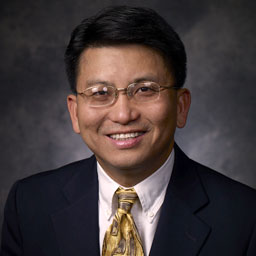
Dr. Mike Peng, O.P. Jindal Distinguished Chair of Management, has been named to the list of Highly Cited Researchers from Clarivate Analytics (formerly of Thomson Reuters), for the fourth consecutive year.
The 2017 list includes more than 3,300 researchers in 21 fields of the sciences and social sciences. These scholars have published a high number of papers that rank in the top 1 percent most cited in their respective fields over the last decade, and have been listed in The World’s Most Influential Scientific Minds.
Peng, a professor of organizations, strategy and international management, is among the 93 scholars named in the field of economics and business.
“It is gratifying to see that my research continues to be of value to the scholarly community worldwide,” Peng said. “There is vigorous competition in the market for ideas, whose winners are cited. Given space constraints, the number of references in every paper is limited. Therefore, overly narrow, nonessential, and non-novel publications will not be widely cited. I have always endeavored to take on some big questions, which is a risky research strategy. But I am glad it has paid off.”
A leading expert on global business strategy, Peng is best known for his development of the institution-based view of strategy and his insights about the rise of emerging economies in global business.
His research has investigated business strategies in Africa, Asia, Europe and North America. Both the United Nations and the World Bank have cited his work.
JSOM Professor Appointed a Fellow of Two Professional Societies
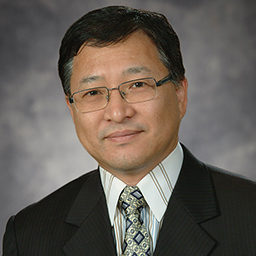
A globally recognized organizational psychologist who specializes in international management issues, Organizations, Strategy and International Management Professor Riki Takeuchi was named a fellow of two professional organizations in recent months.
The Association for Psychological Science named him a fellow in June. The association’s president awards fellow status to members who have made sustained outstanding contributions to the science of psychology in the areas of research, teaching, service, and/or application. Scientists, academics, clinicians, researchers, educators, administrators, and students from more than 80 countries belong to the 30,000-member association, which is dedicated to the scientific study of psychology.
In April, the Society for Industrial and Organizational Psychology announced Takeuchi’s appointment as a fellow at the society’s 2018 meeting in Chicago. SIOP Fellows are psychologists recognized for having made “an unusual and outstanding contribution to the field.” Takeuchi’s election is his second honor from SIOP, a professional organization for those who practice and teach industrial and organizational psychology. In 2010, the society gave him its Distinguished Early Career Contributions Award.
Appointed last fall as the first Jindal School of Management Advisory Council Distinguished Professor, Takeuchi is known for his research in cross-cultural adjustment processes, social exchange relationships and strategic human resource management, with particular focus on employer-employee relationships.
His work includes 29 refereed journal articles and six book chapters. He has delivered many presentations at the Academy of Management and SIOP conferences, among others. He has served on the editorial boards of six major management journals and recently completed a term as associate editor for the Academy of Management Journal.
Professor Elected a Fellow of the International Academy of Business
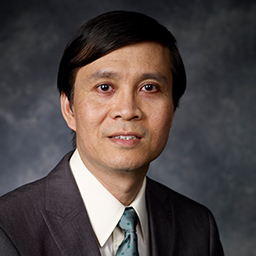
Dr. Eric W. K. Tsang, Dallas World Salute Distinguished Professor in Global Strategy, was elected a fellow of the Academy of International Business in March. He was inducted in a ceremony at the AIB 2018 Annual Meeting in Minneapolis in June.
AIB Fellows are a select group of distinguished academy members recognized for either their outstanding scholarly contributions to the field of international business or their significant contributions to the academy.
What is special about Tsang’s work is that his research interests are much broader than international business. He is also a leading scholar in applying philosophy to solve methodological problems related to assumption, explanation, generalization, ontology, replication and theory testing. Some of these research results were included in his book The Philosophy of Management Research (New York: Routledge, 2017).
“In this sense, I am an ‘outlier’ among the fellows,” he says.
Tsang was a corporate banker at HSBC in Hong Kong when he decided to pursue a different career path. He left HSBC to work at Nanyang Technological University in Singapore, where he was an associate professor. After making his decision to join academia, he attended the University of Cambridge, where he earned his PhD in management in 1997. He taught at Wayne State University before arriving at UT Dallas in 2007. He was an honorary professor at Sun Yat-sen University in China.
Currently an editorial board member of eight academic journals, he also serves as deputy editor-in-chief of Management and Organization Review.
Jindal School Professor Recognized for Mentoring Excellence
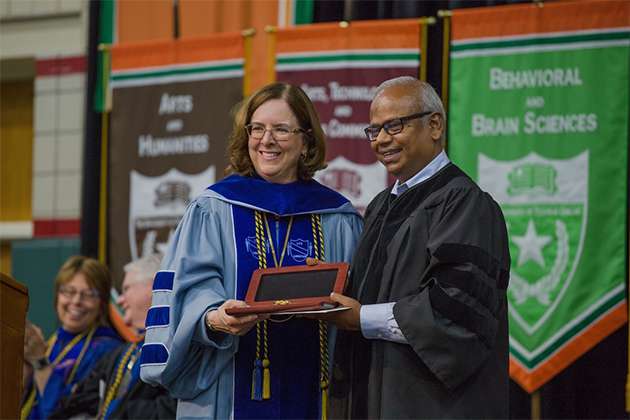
Naveen Jindal School of Management faculty member Dr. Suresh Radhakrishnan was honored during the spring 2018 Doctoral Hooding Ceremony at The University of Texas at Dallas for sustained excellence in graduate research mentoring.
Radhakrishnan, Constantine Konstans Distinguished Professor of Accounting and Information Management, was recognized May 8 with the 2018 Provost’s Award for Faculty Excellence in Graduate Research Mentoring.
“The award belongs to the students and my colleagues for their hard work and support,” Radhakrishnan said. “Successful mentoring would not have been possible otherwise.” Dr. Inga Musselman, UT Dallas vice president for academic affairs and provost, created the mentoring awards and presented them at the ceremony.
This was the second year that the graduate award was given; the undergraduate award was first bestowed in 2013.
Prior to calling Radhakrishnan to the lectern, Musselman read from some of the nomination letters. Dr. Ram Natarajan, associate professor of accounting in the Jindal School, wrote that Radhakrishnan “had been involved in the dissertations of as much as half of the PhD students who have graduated from our doctoral program [in accounting] since its inception.”
Dr. Albert Tsang, PhD’08, MS’02, associate professor at the Schulich School of Business at York University, wrote that, “mentoring is the heart of the PhD education, and with this heart, [Radhakrishnan] shows us more than what we can learn from any books, papers or lectures. He not only taught us how to do research, but he also demonstrated the way by which one can earn respect from the academic profession.”
Dr. Paul Mason, PhD’08, assistant professor of accounting and business law at Baylor University, wrote in his nominating letter that Radhakrishnan “provided a perfect balance between offering direction and suggestions while allowing for independence during the completion of my degree.”
Mason also explained that Radhakrishnan approached his role as a mentor by contributing “to the scholarship and professional development of the mentee even if it doesn’t benefit him directly.” This, Mason explained, is how he knew that “a true mentoring relationship exists.”
Jindal School Professor Earns Best Paper Award
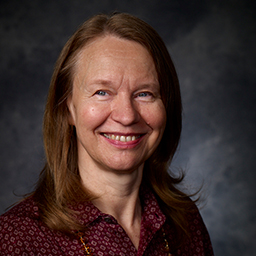
Dr. Kathryn E. Stecke, Ashbel Smith Professor of Operations Management, and her co-authors received a Best Paper of 2017 Award from Omega – The International Journal of Management Science for research initiated at the request of Sandia National Laboratories.“Mitigating Disruptions in a Multi-Echelon Supply Chain Using Adaptive Ordering” which appeared in the April 2017 issue of Omega (Volume 68, page 185-198), examined response to and recovery from supply chain interruptions.
Stecke and her fellow researchers noted that disruptions may stem from natural disasters — such as earthquakes; accidents — such as oil spills; and intentional acts — such as terrorist attacks. They estimated that disruptions in 2011, the costliest ever for natural disasters, cost more than $350 billion.
The researchers found through simulation experiments “that the impact of a disruption depends on its location, with costlier and longer lasting impacts occurring from disruptions … close to ultimate consumption.”
They learned that “expediting, an adaptive ordering approach often used to mitigate disruptions, can trigger unintended bullwhip effects, and hurt rather than help overall performance.”
Their findings, they wrote, “leave no doubt that variability in quantity and timing, whether from normal operations, disruptions, or expediting, tends to be amplified in supply chains.”
A project leader at Sandia noted that one significant practical result of their work was that it “demonstrated the importance of careful design in modeling the realities of supply chain behavior.”
Stecke’s co-authors were Thomas G. Schmitt of the University of Washington, Fred W. Glover of OptTek Systems Inc., Mark A. Ehlen of Sandia National Laboratories and Sanjay Kumar of Valparaiso University.
An associate professor of information and decision science, Kumar was a student of Stecke’s who earned two degrees from UT Dallas, an MS in management and administrative sciences in 2005, and a PhD in management science in 2009.
JSOM Faculty Member Earns Accounting Educator of the Year Award
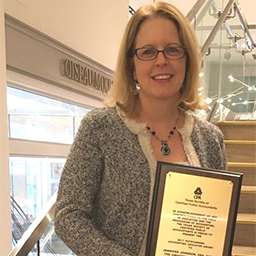
Jennifer Johnson, a senior lecturer in accounting, received a 2017 Outstanding Accounting Educator Award from the Texas Society of Certified Public Accountants.
The statewide award, presented in three categories, to small, medium and large schools, recognizes Texas accounting educators who have exhibited excellence in teaching and who have distinguished themselves through active service to the profession. Criteria for judging includes instructional innovation, student motivation, the pursuit of learning opportunities for students, involvement in student and professional accounting organizations, and research accomplishments and publications.
Johnson, named the large-school winner, and the other recipients each received a plaque and a $500 cash award at the annual TSCPA accounting educators’ conference, held last October in Dallas. She was nominated for the honor by several of her students, former students and Dr. Monica Powell, senior associate dean.
Johnson is a self-described accounting nerd who teaches accounting as the language of business.
“I think that students don’t understand all of the opportunities available to them in this profession,” she said. “I tell my students that, as accountants, we are helping to enact change. Accounting isn’t just a function. It’s a way to help companies grow.”
Johnson joined UT Dallas in 2009 after an accounting career at Dr Pepper Snapple Group, Southwest Securities and PricewaterhouseCoopers. She currently serves on the TSCPA Board of Directors and is treasurer-elect for the Dallas CPA Society.
Student News
Jindal School Team Wins Texas Shoot-Out Real Estate Case Competition
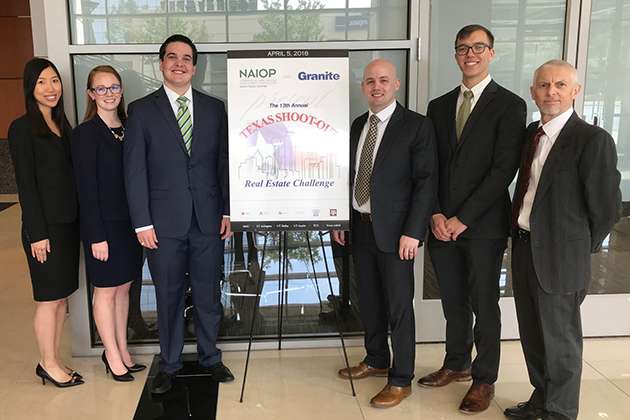
A team of graduate students from the Real Estate Concentration at the Naveen Jindal School of Management won a spring case competition that offered ideas for a revitalization project in the Dallas suburb of Farmers Branch.
The North Texas chapter of the National Association for Industrial and Office Parks, a commercial real estate development association, sponsored the Texas Shoot-Out Real Estate Case Challenge, which tasked competitors with creating an idea for redeveloping five acres of land northeast of the DART rail Farmers Branch Station.
The five acres, said George DeCourcy, associate director of the Real Estate Concentration, were “best described as ‘in transition’.”
UT Dallas team members were double MBA-finance students Joseph Barnett and Colby Porter, MBA students Betsy Cheung and Haylee Tubbs, and master’s in finance student Patrick Kerns. The students took first place and split a $6,000 prize. They prevailed over teams from SMU, TCU, UT Arlington and UT Austin at the April 5 finals.
“One of the things I learned … was that you have to think about this holistically,” Barnett said. “It’s not just a matter of building out a plot of land. It’s about the culture of the community, what’s currently available and what’s needed.”
Farmers Branch Mayor Robert C. Dye laid out the vision for the project in a letter to the competitors, explaining that the city’s request for “a true live, work, play environment that residents, and non-residents alike, can call home” would “help change our City’s landscape for generations to come.”
At a February city-council meeting, Dye introduced an initiative to have Farmers Branch join the worldwide “smart cities” movement in which cities develop infrastructure needed to utilize technology that plugs into the “internet of things.” The development next to the DART rail station became part of a Farmers Branch pilot program. The city asked competitors to expand the development beyond the smart technology and introduce art and culture into the mix.
The team’s proposal, “The Next Chapter for Farmers Branch,” provided market, site and gap analyses and offered a highest-and-best-use proposal for a development that was physically possible, appropriately supported, financially feasible and resulted in the highest value. Students also included a financial analysis and a recommended site design.
“Our team developed a unique mix of retail and office with walkability and environmentally sensitive touches that played off all the surrounding elements and the site potential,” DeCourcy said.
Graduate Student Selected for National Student Entrepreneur Fellowship
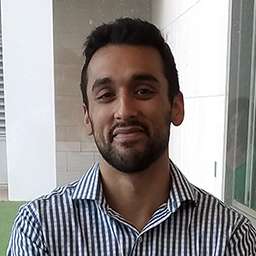
JSOM graduate student Omeed Shams has been accepted into a national fellowship program that he hopes will accelerate his entrepreneurship capabilities and help grow his company.
Shams is one of 17 college students awarded a 2018 Future Founders Fellowship, which provides mentoring, entrepreneurship retreats, peer skill sharing and volunteer opportunities.
“I’m excited to meet these people and stay connected with them, but also learn from them as well. They’re all in a very similar stage that I’m in,” said Shams, a master’s student in innovation and entrepreneurship.
As part of the program, each of the fellows will be sharing skills with their colleagues. Shams’ presentation is called, “How to Build a Team on a Bootstrap Budget.”
His work focuses on a platform called Kwest. In 2016, the app was used as a local scavenger hunt/guided tour platform. Now, Kwest has been updated as an augmented reality gaming platform.
“I think it has a ton of potential — both from a consumer standpoint, but also from an acquisition standpoint,” he says. “If it gets acquired, I will launch something else.”
JSOM Duo Earns Research Fellowship
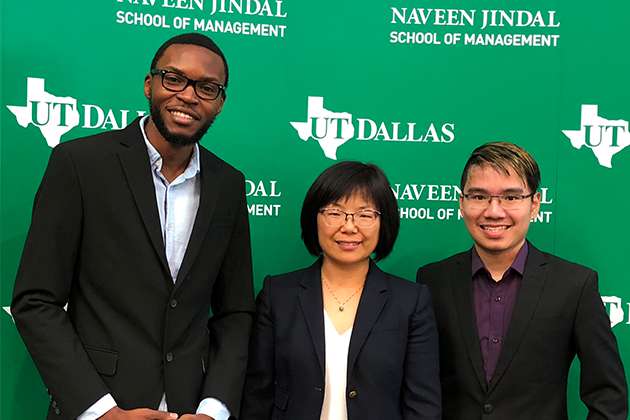
The Global Association of Risk Professionals (GARP) awarded research fellowships in the fall 2017 semester to two students from the Jindal School through its GARP Fellowship Research Program.
Nam Nguyen, who graduated in December with a master’s degree in finance, and Ndackyssa Oyima-Antseleve, who is pursuing the same degree, were each awarded $1,500 to work on a joint project related to global financial risk management, “Bank Credit and Working Capital Management: Risk Analysis in Oil and Gas Industry.” The proposal was based on a project the pair had done in a course, Numerical and Statistical Methods in Finance (FIN 6382), taught by Dr. Liping Ma, a clinical assistant professor of finance.
Ma, who is serving as Nguyen and Oyima-Antseleve’s advisor, said their research awards demonstrate a pattern of success for Jindal School students. “This is the second time that UTD students have won this award,” she said. MS in Finance 2016 alumnus Kamiar Kordi “won this award as a single author in fall of 2016.”
Oyima-Antseleve and Nguyen’s research investigates “the effect of availability of bank credit on the critical operation assets, working capital accounts, which support short-term business routines of a company,” Oyima-Antseleve said. “It focuses mainly on companies in the oil and gas sector and investigates to what extent each sub-industry is affected.”
The two researchers have reviewed the available literature and reinforced their approach to constructing a model that will, according to Oyima-Antseleve, “better capture the systematic relationship between the concerned variables.”
“Once the model is built, our next step will be to report on the analysis and write up the overall research paper,” Oyima-Antseleve said.
The pair plan to submit the paper for publication on the GARP website and in an academic journal.
Alumni News
Jindal School Graduates Take Third in Global IT Challenge
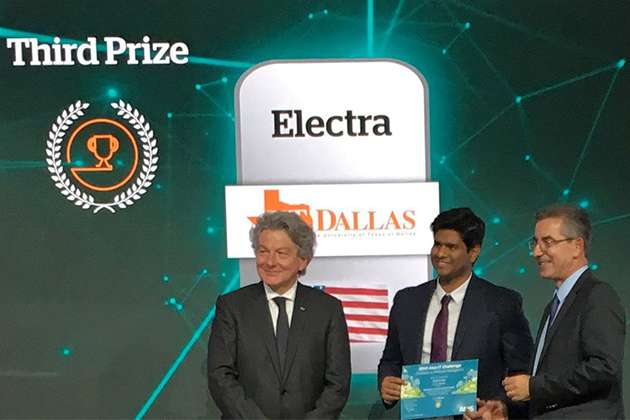
Two recent Jindal School graduates took home a bronze medal from Paris in a global competition to improve customer service with artificial intelligence and chatbots.
Vishal Kamble and Aman Mulkalwar placed third on July 3 in the Atos IT Challenge for their entry Electra for the Utilities, a cloud-based chatbot that can reduce costs and provide better customer service in the utilities industry. The pair received a cash award of 3,000 euros. (Kamble’s Electra presentation begins at 48:36 in the event video.)
The annual contest, sponsored by European IT company Atos, is open to any student enrolled in a college, university or engineering school. The contest, which this year attracted more than 200 entries from several countries, challenged students to develop a prototype using artificial intelligence and conversational interfaces — chatbots — that could help both customers and businesses.
A team of Columbia University students received the gold medal for BTM Solutions, which unlocks automated demand response by using real-time electricity prices. The silver was awarded to students from Russia’s Voronezh State University who designed Masterpiece, a mobile app that lets you discuss art with a chatbot.
Working with Amazon’s web cloud services, Kamble and Mulkalwar devised Electra to provide immediate answers to utilities customers 24 hours a day via text message, Amazon’s Alexa, Facebook Messenger and virtual reality.
“Our idea gives customers a smooth, great experience: Basically, you’re talking to a virtual person who knows the answers to preset questions,” Mulkalwar said.
In December, Electra made the shortlist of 20 entries. Each of the teams then met with a coach who provided technical and business insights. Kamble and Mulkalwar joined forces with Dr. Prakash Shrivastava, an Atos employee who also works as a lecturer at JSOM.
Both Kamble and Mulkalwar graduated in May. Kamble, an MS in Business Analytics alumnus, is now a full-time analytics consultant at Atos, where he had previously interned. He said there was no conflict of interest in entering the challenge because the contest is based in France and involves tech innovation, while his internship was in the U.S. and focused on marketing.
An MS in Information Technology and Management graduate, Mulkalwar was so busy with his job search he could not attend the awards ceremony. His focus paid off: He landed a job with Dell in Austin.
But he is still savoring his success in the challenge, which he said would not have been possible without the Jindal School. “JSOM gave us the resources and the inspiration to implement the idea in real life. The diverse and comprehensive coursework definitely contributed toward the fruition of this idea.”
Company Owned by Jindal School Alumnus Wins Startup Competition
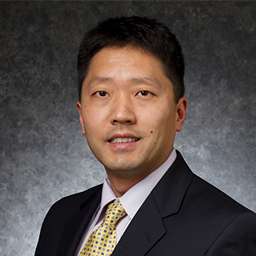
A company founded and run by Jindal School alumnus Dr. Peter Baek has won the $33,000 grand prize in the Penfolds Max’s “Maximum Funding” startup competition.
Vigilant Labels, based out of the Venture Development Center at The University of Texas at Dallas, offers a product that improves patient safety and expedites required anesthesia syringe label printing that integrates with electronic medical record software systems.
Culminating at the end of 2017, the competition, run by Australian wine producer Penfolds, had two phases. The first consisted of a panel of experts from various technology and business firms selecting 10 finalists from more than 100 entrants. The top 10 then underwent a social media voting campaign that determined the three winners.
“Going through this exercise helped us develop as a company,” said Baek. His business interests naturally follow from his career as an anesthesiologist who earned an MS from the Jindal School’s Healthcare Leadership and Management for Physicians program in 2014.
Baek planned to use the winnings to increase the company’s marketing efforts and to strengthen company infrastructure.
“As an entrepreneur, one of the key benefits to being a UT Dallas alum is access to the VDC and the Blackstone LaunchPad,” he said. “They are helping me define the vision for growth and guiding me to make sure that everything looks good not only now, but five or 10 years from now — and that we have an exit strategy.”
As the company continues to grow, Baek remains excited about the possibility of increasing its market share in healthcare workflow optimization and compliance management.
“The demand is out there,” he said. “In terms of what the product does, I think we’ve hit upon the right formula. It’s a great system in terms of patient safety, improving medical compliance, and it is convenient to implement without interrupting the end-user’s workflow.”




